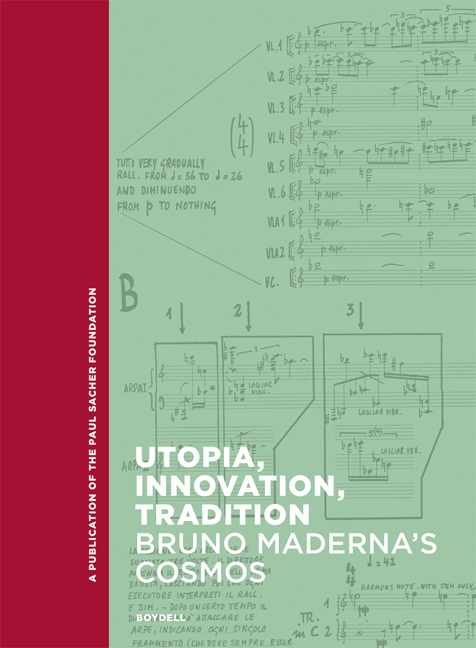Book contents
- Frontmatter
- Contents
- INTRODUCTION
- STAGING AND PERFORMING SOUNDS: A GLANCE THROUGH THE LAST THEATRICAL WORK
- BUILDING SOUNDS: THE COMPOSER
- CREATING SOUND: THE MUSIC BEYOND/WITHOUT THE STAGE
- REINVENTING SOUNDS: DIALOGUES WITH MUSIC OF EVERY EPOCH AND STYLE
- ACROSS BORDERS: THE CONDUCTOR AND THE INTERPRETER
- SEARCHING FOR ROOTS: THE DEVELOPMENT OF A STYLE
- STAGING AND PERFORMING TEXTS: A GLANCE THROUGH EARLY DRAMATURGICAL AND VOCAL WORKS
- Chronology Of Bruno Maderna’s Works
- Selected Bibliography
- Index
“In the Beginning Was the Word”: The Sung Text as a Unifying Element in the Composition of Bruno Maderna’s Satyricon
Published online by Cambridge University Press: 17 January 2024
- Frontmatter
- Contents
- INTRODUCTION
- STAGING AND PERFORMING SOUNDS: A GLANCE THROUGH THE LAST THEATRICAL WORK
- BUILDING SOUNDS: THE COMPOSER
- CREATING SOUND: THE MUSIC BEYOND/WITHOUT THE STAGE
- REINVENTING SOUNDS: DIALOGUES WITH MUSIC OF EVERY EPOCH AND STYLE
- ACROSS BORDERS: THE CONDUCTOR AND THE INTERPRETER
- SEARCHING FOR ROOTS: THE DEVELOPMENT OF A STYLE
- STAGING AND PERFORMING TEXTS: A GLANCE THROUGH EARLY DRAMATURGICAL AND VOCAL WORKS
- Chronology Of Bruno Maderna’s Works
- Selected Bibliography
- Index
Summary
In an interview with Aldo Maranca in August 1964, Bruno Maderna spoke of the relationship between music and poetry in ancient Greece:
It was a single, indivisible art. It was impossible for the Greeks to imagine it as two parts of a whole. It was a unity. And actually, music had the task of catalyzing the words and the spoken word informed the music of its concepts.
These words are much more than a mere reflection on the artistic legacy of a remote era; in light of Maderna's musical production, they seem to contain a genuine creative manifesto which may have come to its greatest fruition in his last works.
Just seven years after the interview with Maranca, Maderna began composing the central nucleus of Satyricon, his last work for musical theater and a modern transposition of the homonymous Latin novel by Petronius Arbiter. He completed the work two years later, in March 1973. The opera is a mixture of languages, styles, genres, and musical quotations, and has until now been ascribed the status of “fragmentation au carre “ (fragmentation squared). Poised between the concepts of open work, pop-art, and an early postmodernism, Maderna's premature death in November of the same year also played a role in affecting the reading of Satyricon, further implanting the idea of it being an unfinished composition.
There is no doubt that Satyricon defies any analysis that tends to attribute the entire composition to a unitary compositional process or a univocal formal principle. As is known, Maderna makes use of several languages, styles, and compositional methods in the composition of the opera: alongside the massive use of quotations from popular classics, there are stylistic loans from the nineteenth-century operatic tradition, from cabaret, from operetta, and from twentieth-century musical theater (in particular Berg and Weill). And there is more: the stylistic imitations also contemplate the use of acoustic instruments to reproduce the typical sounds of early electronic music, and there is no shortage of parts (such as La Matrona di Efeso and Trimalchio e le flatulenze) where Maderna takes up dodecaphonic and serial composition again, in order to emphasize specific dramatic situations. In terms of dramatic structure and compositional choices, each of the episodes that make up the work seems to be an autonomous organism in its own right.
- Type
- Chapter
- Information
- Utopia, Innovation, TraditionBruno Maderna's Cosmos, pp. 59 - 84Publisher: Boydell & BrewerPrint publication year: 2023



